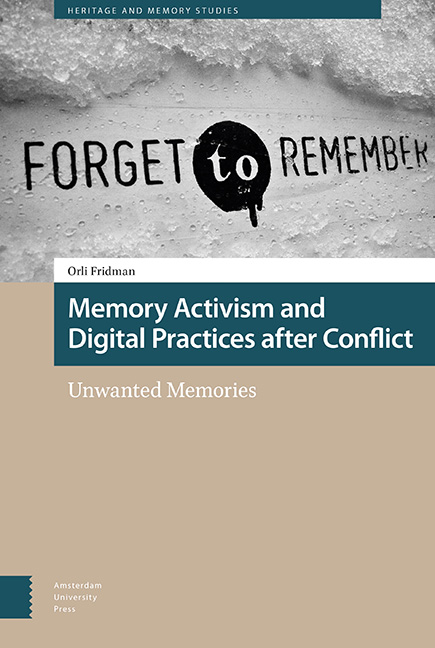Book contents
- Frontmatter
- Table of Contents
- List of Figures
- Preface
- Acknowledgements
- Introduction: Memory Activism and Alternative Commemorative Practices after Conflict
- 1 Unwanted Memories of (the Wars of) the 1990s
- 2 ‘Not in My Name’: From Anti-War to Memory Activism: The First Generation
- 3 ‘Too Young to Remember, Determined Never to Forget’: The Second Generation
- 4 Hashtag Memory Activism: Digital Memory Practices and Online Commemorations
- 5 Regions of Memory: The Post-Yugoslav Space as a Region of Memory Activism
- Epilogue: Unwanted Pasts in an Unresolved Present
- Appendices
- Bibliography
- Index
2 - ‘Not in My Name’: From Anti-War to Memory Activism: The First Generation
Published online by Cambridge University Press: 07 October 2022
- Frontmatter
- Table of Contents
- List of Figures
- Preface
- Acknowledgements
- Introduction: Memory Activism and Alternative Commemorative Practices after Conflict
- 1 Unwanted Memories of (the Wars of) the 1990s
- 2 ‘Not in My Name’: From Anti-War to Memory Activism: The First Generation
- 3 ‘Too Young to Remember, Determined Never to Forget’: The Second Generation
- 4 Hashtag Memory Activism: Digital Memory Practices and Online Commemorations
- 5 Regions of Memory: The Post-Yugoslav Space as a Region of Memory Activism
- Epilogue: Unwanted Pasts in an Unresolved Present
- Appendices
- Bibliography
- Index
Summary
Abstract
This chapter analyses the first generation of memory activists in Serbia. It explores the mnemonic claims of these actors – whose memory activism extends from earlier anti-war activism in the 1990s – as well as the alternative calendars and alternative commemorative rituals they have established. These calendars and rituals are utilized as a framework for tracing the ways in which anti-war groups, particularly the Women in Black in Serbia, have maintained their presence in the streets after regime change on 5 October 2000. The chapter shows how they continue to represent a critical if marginal opposition in their society, largely through a programme of alternative commemorative actions, at the heart of which remains the annual July 10th commemoration of victims of the Srebrenica genocide.
Keywords: generational lens, memory activism, anti-war, alternative calendars, alternative commemorative rituals
This chapter analyses the emergence of the first generation of memory activists in Serbia, in the aftermath of the violent break-up of Yugoslavia. It explores the mnemonic claims of these actors, whose activism extended from that of anti-war groups already formed in the early 1990s and focuses on the alternative calendars and alternative commemorative rituals they have established – which have become sites of the contested territory of counter-memories (Zerubavel 1995). I am particularly interested in this generation of activists as members of a community of memory, among various communities of memory in Serbia, where activists present countermemories of the wars of the 1990s and insist on engagement with these unwanted memories. As a community of memory, these activists have brought their feminist, anti-nationalist, and anti-war agenda into their memory activism, carrying their work in the 1990s into the 2000s.
The alternative calendars and commemorative rituals created by these activists lay the path for this chapter, which traces the ways in which anti-war groups, and particularly the Women in Black in Serbia, maintained their presence in the streets after regime change on 5 October 2000. I show how they have continued to play the role of a critical, if marginal opposition in their society, doing so largely through street actions centred around alternative commemorative rituals. At the heart of these rituals, I argue, remains the annual 10 July commemoration of victims of the Srebrenica genocide.
- Type
- Chapter
- Information
- Memory Activism and Digital Practices after ConflictUnwanted Memories, pp. 71 - 96Publisher: Amsterdam University PressPrint publication year: 2022

